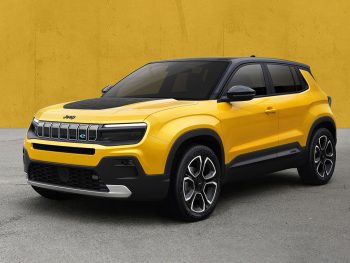Fully electric Jeep SUV revealed under Stellantis’ 2030 strategic plan
Stellantis has revealed images of the first-ever fully battery-electric Jeep SUV as it announces plans to have more than 75 battery electric vehicles (BEVs) by 2030.

The fully electric Jeep arrives 2023
Speaking during the group’s Dare Forward 2030 strategic plan presentation, CEO Carlos Tavares said the brand is targeting to have 100% of sales in Europe and 50% of sales in the United States to be BEVs by the end of this decade.
The plan is to have global annual BEV sales of five million vehicles by 2030.
Model additions will include the fully electric Jeep, which arrives 2023. Details and specifications are yet to be announced but it will sit between the Renegade and the Compass and join the plug-in hybrid versions of these models, advancing the brand’s vision of Zero Emission Freedom.
This will be followed by the Ram ProMaster BEV later in 2023 and the Ram 1500 BEV pickup truck in 2024; the brand says it will have a specific US product offensive of more than 25 all-new BEVs.
Meanwhile, Stellantis will expand its hydrogen fuel cell technology to large vans in 2024, with a first US offering in 2025 and further expanding to heavy-duty trucks.
Stellantis has also committed to becoming “the industry champion in the fight against climate change”, reaching carbon net zero emissions by 2038.
Carlos Tavares said: “Dare Forward 2030 inspires us to become so much more than we’ve ever been. We are expanding our vision, breaking the limits and embracing a new mindset, one that seeks to transform all facets of mobility for the betterment of our families, communities and the societies in which we operate.
“Powered by our diversity, Stellantis leads the way the world moves by delivering innovative, clean, safe, and affordable mobility solutions.”
Last year saw Stellantis commit at its online EV Day 2021 that Vauxhall’s complete line-up of cars and vans will be fully electric by 2028 as parent firm Stellantis intensifies its EV offensive to deliver “advanced technology at affordable prices”.
Stellantis also announced last year that it’s investing £100m to turn Ellesmere Port into its first dedicated electric vehicle manufacturing site, safeguarding the plant’s future. Ellesmere will be used to produce both the LCV and passenger-carrying versions of the Vauxhall/Opel Combo-e, Peugeot e-Partner and the Citroën e-Berlingo, due at the end of 2022. It’s also looking to increase its planned battery capacity by 140 gigawatt-hours (GWh) to approximately 400 GWh.
At yesterday’s strategic plan presentation, the group also announced plans to be number one in customer satisfaction for its products and services in every market.
It also said it will lead the commercial vehicle market “with the most efficient portfolio of products and services bringing exceptional solutions to our professional customers” and will make Stellantis “an extraordinary place to work and a magnet for people with the drive to make customers’ lives better”.
Other targets include doubling net revenues by 2030 and sustaining double-digit adjusted operating income margins throughout the decade; the brand also said it’s looking for a fourfold increase in new car revenues from premium and luxury vehicle segments.












